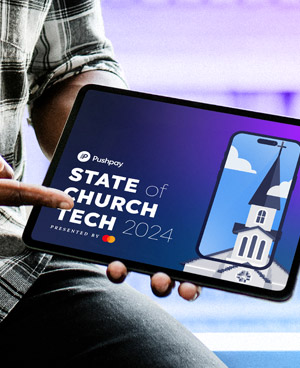Leaders Are Abandoning The Idea Of In-Person-Only Ministry
The numbers on hybrid church were consistent with previous years, with the vast majority of ministries continuing to commit to digital tools like livestreaming, online giving, church management software and more.
The surprise, however, was the sharp decline in churches’ desire to return to an in-person-only model—against last year’s data, 21% fewer churches envision scrapping their hybrid gameplan in the next twelve months.
The report suggests this shift might be tied to our distance from the pandemic. Clay agrees that churches have discovered the value of technology and are unlikely to go backwards in their approach to discipleship:
“There’s a verse that I love in John 2 that says, ‘Though I write to you now with pen and ink, I long to be with you face-to-face so that our joy may be complete.’ What I interpret what John’s saying there is, yes, face-to-face is most complete, but he’s not neglecting the fact that I can’t be with you right now, and so therefore he’s writing to you with pen and ink. He’s leveraging—in his case—the technology of the day.”
Clay goes on to discuss how the Church is finding and accepting a new middle ground between in-person and tech, and embracing how the two channels for discipleship aren’t at odds with one another but, when done correctly, are complimentary when engaging the community.
Insecurity Plagues The Next Generation Of Decision Makers
The State of Church Tech report only surveys those leaders who are “decision makers” or “influencers” with regard to their church’s tech adoption choices.
And yet, when asked how confident they were when making those choices, nearly half said they were not confident making digital decisions.
Clay’s first reaction to hearing this statistic was, while he has a strong background in technology, most church leaders do not. Even if they do, leaders are far too busy to keep up with all the latest trends, updates, and tools available—and even he doesn’t feel confident when making these decisions.
“We’ve all had that experience where a software or an app that you’re really used to using, even if it’s your banking app, every month or so they update their app. We all know that feeling, you click on the app and think, ‘Where did the deposit-the-check button go? They moved it!’ It’s hard to keep up with something even as simple as that.”
He goes on to discuss the constant state of being a “newb” with tech, as well as how generational differences and the unique needs of churches all play into the dynamic of insecurity.
Churches Are Eager To Experiment With New Tech
The third major theme discussed in the report is the sometimes-fickle enthusiasm around emerging tech solutions. For example, the metaverse seemed poised to explode in ministries last year; since then, metaverse usage instead dropped significantly, and the amount of leaders considering adopting the tool in the future fell as well.
2024’s trendy emerging tech is, of course, artificial intelligence (AI). The statistics on churches currently using generative AI, plus those who are seriously considering doing so in the future, virtually mirror the metaverse numbers from last year—so is AI headed for a similar fall?
Clay acknowledges that the previous hype around metaverse was partially bolstered by Facebook rebranding to Meta and all the press coverage surrounding it—and he’s not surprised by the subsequent drop in popularity.
AI, however, may have a more positive trajectory ahead. “The cost for leveraging AI for your church is so much less significant,” Clay explains. He talks about using AI that very morning to help shape a sermon.
Referring to AI as an “intern,” he gives an example of the creative use cases churches may embrace that they haven’t yet considered:
“We had a pastor… who said I haven’t gotten the chance to use [AI] for sermon prep yet, but I had a really difficult conversation with a volunteer today. I was going to have to lay this volunteer off because of some decisions he had made, and I was nervous about the conversation and unsure how it was going to go. I leveraged ChatGPT to help me think through how do I put myself in his shoes, how do I care for him well… He said the conversation went so much better that I could’ve believed it would have gone, and it was because I was able to prepare.”
Clay also discusses how to best have conversations with staff and community members about using AI before committing.
The webinar recording is full of other incredible stories and insights from Clay. Want to hear his suggestions on implementing church in an innovative way? His best practices for programming outside of Sunday? Check it out now!
Get A Free Report Assessing Your Current Tech
Pushpay’s Church Tech Check is a seven-minute online assessment that asks simple questions about your current digital tools, then instantly generates a custom report with scores, rankings, resources and actionable next steps as your church plots its hybrid future.








